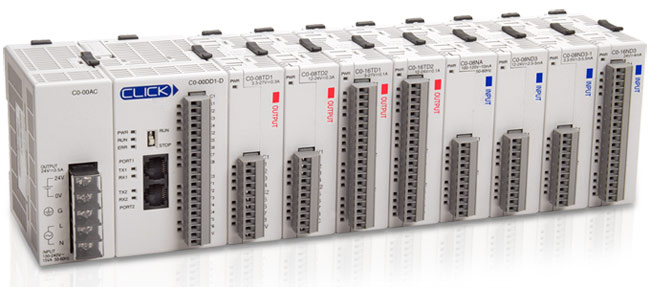
Security News
Research
Data Theft Repackaged: A Case Study in Malicious Wrapper Packages on npm
The Socket Research Team breaks down a malicious wrapper package that uses obfuscation to harvest credentials and exfiltrate sensitive data.
Python ≥3.8 driver and command-line tool for Koyo Ethernet ClickPLCs.

pip install clickplc
$ clickplc the-plc-ip-address
This will print all the X, Y, DS, and DF registers to stdout as JSON. You can pipe this as needed. However, you'll likely want the python functionality below.
This uses Python ≥3.5's async/await syntax to asynchronously communicate with a ClickPLC. For example:
import asyncio
from clickplc import ClickPLC
async def get():
async with ClickPLC('the-plc-ip-address') as plc:
print(await plc.get('df1-df500'))
asyncio.run(get())
The entire API is get and set, and takes a range of inputs:
>>> await plc.get('df1')
0.0
>>> await plc.get('df1-df20')
{'df1': 0.0, 'df2': 0.0, ..., 'df20': 0.0}
>>> await plc.get('y101-y316')
{'y101': False, 'y102': False, ..., 'y316': False}
>>> await plc.set('df1', 0.0) # Sets DF1 to 0.0
>>> await plc.set('df1', [0.0, 0.0, 0.0]) # Sets DF1-DF3 to 0.0.
>>> await plc.set('y101', True) # Sets Y101 to true
Currently, the following datatypes are supported:
| x | bool | Input point |
| y | bool | Output point |
| c | bool | (C)ontrol relay |
| t | bool | (T)imer |
| ct | bool | (C)oun(t)er |
| ds | int16 | (D)ata register, (s)ingle signed int |
| dd | int32 | (D)ata register, (d)double signed int |
| dh | uint16 | (D) register, (h)ex |
| df | float | (D)ata register, (f)loating point |
| td | int16 | (T)ime (d)elay register |
| ctd | int32 | (C)oun(t)er Current Values, (d)ouble int |
| sd | int16 | (S)ystem (D)ata register |
Recent ClickPLC software provides the ability to export a "tags file", which contains all variables with user-assigned nicknames. The tags file can be used with this driver to improve code readability. (Who really wants to think about modbus addresses and register/coil types?)
To export a tags file, open the ClickPLC software, go to the Address Picker, select "Display MODBUS address", and export the file.
Once you have this file, simply pass the file path to the driver. You can now
set variables by name and get all named variables by default.
async with ClickPLC('the-plc-ip-address', 'path-to-tags.csv') as plc:
await plc.set('my-nickname', True) # Set variable by nickname
print(await plc.get()) # Get all named variables in tags file
Additionally, the tags file can be used with the commandline tool to provide more informative output:
$ clickplc the-plc-ip-address tags-filepath
FAQs
Python driver for AutomationDirect (formerly Koyo) Ethernet ClickPLCs.
We found that clickplc demonstrated a healthy version release cadence and project activity because the last version was released less than a year ago. It has 4 open source maintainers collaborating on the project.
Did you know?

Socket for GitHub automatically highlights issues in each pull request and monitors the health of all your open source dependencies. Discover the contents of your packages and block harmful activity before you install or update your dependencies.

Security News
Research
The Socket Research Team breaks down a malicious wrapper package that uses obfuscation to harvest credentials and exfiltrate sensitive data.

Research
Security News
Attackers used a malicious npm package typosquatting a popular ESLint plugin to steal sensitive data, execute commands, and exploit developer systems.

Security News
The Ultralytics' PyPI Package was compromised four times in one weekend through GitHub Actions cache poisoning and failure to rotate previously compromised API tokens.